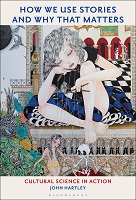How We Use Stories and Why That Matters
Cultural Science in Action
Author(s)
Hartley, John
Collection
Knowledge Unlatched (KU)Number
7326Language
EnglishAbstract
How We Use Stories and Why That Matters guides the reader through the tangled undergrowth of communication and cultural expression towards a new understanding of the role of group-mediating stories at global and digital scale. It argues that media and networked systems perform and bind group identities, creating bordered fictions within which economic and political activities are made meaningful. Now that computational and global scale, big data, metadata and algorithms rule the roost even in culture, subjectivity and meaning, we need population-scale frameworks to understand individual, micro-scale sense-making practices. To achieve that, we need evolutionary and systems approaches to understand cultural performance and dynamics. The opposing universes of fact (science, knowledge, education) and fiction (entertainment, story and imagination) – so long separated into the contrasting disciplines of natural sciences and the humanities – can now be understood as part of one turbulent sphere of knowledge-production and innovation. Using striking examples and compelling analysis, the book shows what the New York Shakespeare Riots tell us about class struggle, what Death Cab for Cutie tells us about media, what Kate Moss’s wedding dress tells us about authorship, and how Westworld and Humans imagine very different futures for Artificial Intelligence: one based on slavery, the other on class. Together, these knowledge stories tell us about how intimate human communication is organised and used to stage organised conflict, to test the ‘fighting fitness’ of contending groups – provoking new stories, identities and classes along the way.
Keywords
Social Science; Media Studies; Performing Arts; Film; History & CriticismDOI
10.5040/9781501351662ISBN
9781501351631, 9781501351655, 9781501351655, 9781501351648Publisher
Bloomsbury AcademicPublisher website
https://www.bloomsbury.com/academic/Publication date and place
2020Grantor
Imprint
Bloomsbury AcademicClassification
Media studies
Film history, theory or criticism


 Download
Download Download
Download